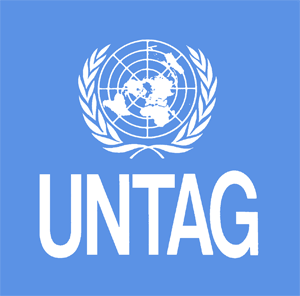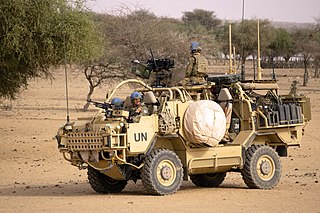Related Research Articles

Peacekeeping comprises activities intended to create conditions that favour lasting peace. Research generally finds that peacekeeping reduces civilian and battlefield deaths, as well as reduces the risk of renewed warfare.

The United Nations Mission in Sierra Leone (UNAMSIL) was a United Nations peacekeeping operation in Sierra Leone from 1999 to 2006. It was created by the United Nations Security Council in October 1999 to help with the implementation of the Lomé Peace Accord, an agreement intended to end the Sierra Leonean civil war. UNAMSIL expanded in size several times in 2000 and 2001. It concluded its mandate at the end of 2005, the Security Council having declared that its mission was complete.

The United Nations Organization Stabilization Mission in the Democratic Republic of the Congo or MONUSCO, an acronym based on its French name Mission de l'Organisation des Nations Unies pour la stabilisation en République démocratique du Congo, is a United Nations peacekeeping force in the Democratic Republic of the Congo (DRC) which was established by the United Nations Security Council in resolutions 1279 (1999) and 1291 (2000) to monitor the peace process of the Second Congo War, though much of its focus subsequently turned to the Ituri conflict, the Kivu conflict and the Dongo conflict. The mission was known as the United Nations Mission in the Democratic Republic of Congo or MONUC, an acronym of its French name Mission de l'Organisation des Nations Unies en République démocratique du Congo, until 2010.

The United Nations Peacekeeping Force in Cyprus (UNFICYP) is a United Nations peacekeeping force that was established under United Nations Security Council Resolution 186 in 1964 to prevent a recurrence of fighting following intercommunal violence between the Greek Cypriots and Turkish Cypriots, to contribute to the maintenance and restoration of law and order and to facilitate a return to normal conditions. Major General Ingrid Gjerde is the current Force Commander of UNFICYP, appointed in 2021, and preceded by Cheryl Pearce (Australia). Assistant Police Commissioner Satu Koivu (Finland) is the current Senior Police Adviser appointed in 2021.

The United Nations Operation in the Congo was a United Nations peacekeeping force deployed in the Republic of the Congo in 1960 in response to the Congo Crisis. ONUC was the UN's first peacekeeping mission with significant military capabilities and remains one of the largest UN operations in size and scope.

The United Nations Mission in Liberia (UNMIL) was a peacekeeping operation established in September 2003 to monitor a ceasefire agreement in Liberia following the resignation of President Charles Taylor and the conclusion of the Second Liberian Civil War (1999–2003). At its peak it consisted of up to 15,000 U.N. military personnel and 1,115 police officers, along with civilian political advisors and aid workers.

The International Force East Timor (INTERFET) was a multinational non-United Nations peacemaking task force, organised and led by Australia in accordance with United Nations resolutions to address the humanitarian and security crisis that took place in East Timor from 1999–2000 until the arrival of UN peacekeepers. INTERFET was commanded by an Australian military officer, Major General Peter Cosgrove.

The United Nations Disengagement Observer Force (UNDOF) is a United Nations peacekeeping mission tasked with maintaining the ceasefire between Israel and Syria in the aftermath of the 1973 Yom Kippur War. The mission was established by United Nations Security Council Resolution 350 on 31 May 1974, to implement Resolution 338 (1973) which called for an immediate ceasefire and implementation of United Nations Security Council Resolution 242.

United Nations (UN) peacekeeping missions involving Pakistan cover about 70 operations throughout different parts of the world. Pakistan joined the United Nations on 30 September 1947, despite opposition from Afghanistan because of the Durand Line issue. The Pakistan Armed Forces are the sixth largest contributor of troops towards UN peacekeeping efforts, behind Ethiopia and Rwanda.
Contingent Owned Equipment (COE) is the equipment owned and brought by United Nations member states to peacekeeping missions. The UN financially reimburses member states for their contributions of COE, and also for the self sustainment services they provide to contingents. This method of reimbursement is commonly referred to as the “COE System". UN staff in peacekeeping missions serve as COE inspectors, verifying that the member states' equipment and the services they provide meet the standards required for reimbursement.
The United Nations Peacekeeping efforts began in 1948. Its first activity was in the Middle East to observe and maintain the ceasefire during the 1948 Arab–Israeli War. Since then, United Nations peacekeepers have taken part in a total of 72 missions around the globe, 12 of which continue today. The peacekeeping force as a whole received the Nobel Peace Prize in 1988.

The United Nations Mission in the Central African Republic and Chad (MINURCAT) was a United Nations peacekeeping mission established by the United Nations Security Council on September 25, 2007 to provide a multidimensional presence of up to 350 police and military personnel to eastern Chad and north-eastern Central African Republic

The Bangladesh Armed Forces and the Bangladesh Police have been actively involved in a number of United Nations Peace Support Operations (UNPSO) since 1988. Currently Bangladesh is the largest contributor in the UN peacekeeping missions.

The United Nations Police (UNPOL) is an integral part of the United Nations peace operations. Currently, about 11530 UN Police officers from over 90 countries are deployed in 11 UN peacekeeping operations and 6 Special Political Missions. The "mission of the UN Police is to enhance international peace and security by supporting Member States in conflict, post-conflict and other crisis situations to realise effective, efficient, representative, responsive and accountable police services that serve and protect the population".

The Australian Services Contingent was the Australian Army contribution to the United Nations Transition Assistance Group (UNTAG) peacekeeping mission to Namibia in 1989 and 1990. Australia sent two contingents of over 300 engineers each to assist the Special Representative of the Secretary General, Martti Ahtisaari, in overseeing free and fair elections in Namibia for a Constituent Assembly in what was the largest deployment of Australian troops since the Vietnam War.

So far India has taken part in 49 Peacekeeping missions with a total contribution exceeding 200,000 troops and a significant number of police personnel having been deployed and more than 160 Indian peacekeepers have paid the ultimate price in service to peace, losing their lives serving under the UN flag as of September 2022. In 2014 India is the third largest troop contributor country [TCC] with 7,860 personnel deployed with ten UN Peacekeeping Missions of which 995 are police personnel, including the first Female Formed Police Unit under the UN. Recently Indian Peacekeepers were lauded by the UN for their efforts in preventing a carnage in the South Sudan conflict which resulted in the death of two of its soldiers.

Operation Newcombe was the code name for two separate and concurrent British non-combat military operations in Mali. One operation involved logistical and airlift support for the French-led Operation Barkhane, whilst the other encompassed peacekeeping in support of the United Nations Multidimensional Integrated Stabilization Mission in Mali (MINUSMA). The operation was first launched on 13 January 2013 by Prime Minister David Cameron and initially involved strategic airlift and aerial reconnaissance. It later saw the deployment of a detachment of Chinook transport helicopters, before shifting its emphasis to UN peacekeeping in 2020. The operation ultimately drew to a close on 14 November 2022 due to political instability in the country.

The United Nations Observer Mission in Sierra Leone (UNOMSIL) was a United Nations peacekeeping operation in Sierra Leone from 1998 to 1999 that was established with the passage of United Nations Security Council Resolution 1181. Its mission was to monitor the military and security situation in Sierra Leone. The mission was terminated in October 1999, when the Security Council authorized deployment of a new, and significantly larger peacekeeping operation, the United Nations Mission in Sierra Leone (UNAMSIL).

Operation Snowgoose is the Canadian involvement in the UN peacekeeping mission in Cyprus (UNFICYP). This operation was established in 1964 alongside the UN peacekeeping mission in Cyprus with the goal of reducing tensions between the Greek Cypriot and Turkish Cypriot populations on the island. Canada's participation with UNFICYP was named "Snowgoose" in 1974, and has one of the longest durations of any Canadian peacekeeping operation. Over 33,000 Canadians have served since the beginning of this mission, but currently only one Canadian participates in the operation per year.
References
- ↑ Letters of Assist (The Free Dictionary)
- ↑ Contingent Owned Equipment; Deployment in the Field (United Nations Peacekeeping COE subsite, Accessed July 6th 2013)
- ↑ Review of the financial situation, section B. Peacekeeping Operations, paragraph 18 (Improving the financial situation of the United Nations; Report of the Secretary-General - Addendum [14th May 2013] Accessed 6 July 2013.)